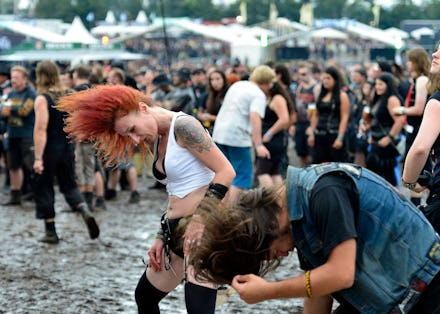Science Has Very Bad News for Heavy Metal Fans

Sorry, metal fans, but according to Consequence of Sound, you should probably give your constant "rocking out" a rest.
Studies have shown that headbanging — meaning a violent thrashing of the head in time with music — can cause spinal injury, or even an aneurism.
According to BBC News, more and more doctors are pushing to alert people (especially metal fans) of the dangers of headbanging, especially after an incident in July of this year when a 50-year-old man developed a blood clot in his brain after a Motörhead concert.
He wasn't the first. In the early '90s, a 15-year-old drummer in a small neighborhood rock band suffered an aneurysm in his neck from "violent head and neck motion." Only a year after surgery did he recover.
The practice seems to have originated at a Led Zeppelin concert in 1968 (their first U.S. tour), the people in the front row of the audience were banging their heads on the stage to the beat of the music. It entered the mainstream in the 1970s, when rock and metal bands like Black Sabbath and Deep Purple started whipping their heads along to their music, which was known to reach high speeds of about 145-200 beats per minute. It later supposedly claimed its name thanks to Motörhead. Lemmy, the band's frontman, said in an interview in the documentary The Decline of Western Civilization II: The Metal Years that the term "headbanger" stemmed from their band's name, as in "Motörheadbanger."
But though the practice has historically been seen as a way to express appreciation for metal music, the health risk is too high to ignore — not only for fans, but for the metal musicians as well.
Terry Balsamo, a guitarist for Evanescence, suffered a stroke in 2005 that was linked to his onstage headbanging. He had a blood clot in his neck. After taking a break, he began touring with the band again, but was more careful with his head and neck movements.
In 2008, the British Medical Journal sought to investigate whether headbanging was indeed a real danger, or if medical professionals were just being overzealous. The researchers attended a number of rock and metal concerts to observe the "headbanging motion," which they studied in the same way that scientists look at car crash injuries. They found that there are many different types of headbanging, including "the up-down, the circular swing, the full body, or the side-to-side."
Metallica bassist Jason Newsted, a fan of the "circular swing," said that "physical duress" and "the physical damage I have done to myself over the years while playing the music that I love" was the main reason he was leaving the band.
He had good reason to leave. The researchers found your head and neck only have a certain finite range of motion and speed before headbanging causes physical stress. The magic number for a song to become dangerous, it turns out, is a rhythm of 130 bpm or more (the speed of many classic metal songs). That's the point at which the risk of suffering a neck injury skyrockets.
"The songs, such as Spinal Tap's 'Tonight I'm Gonna Rock You Tonight" and 'Kickstart My Heart' by Mötley Crüe, could be combined with a 120 degree range of neck movement and theoretically lead to a high risk of neck injury. This exceeds a proposed limit for human tolerance."
In the Consequence of Sound piece titled, "Is Headbanging Dangerous?" author Sarah Kurchak points out that even though studies have proven time and time again that the headbanging can cause serious damage, it isn't likely that people will make a conscious effort to stop anytime soon.
"Asking metal fans to stop headbanging is maybe even less effective than expecting teenagers to remain virginal," Kurchak wrote. "It's going to happen, and we need to be realistic about what we can and cannot do to make those experiences as safe as possible."
According to Scientific American, one way to help prevent injury is to "to rotate your neck at no more than 45 degrees." Again, it doesn't seem likely that metal fans will pack up their headbanging ways, especially when many hardcore bands are making music that they want their fans to headbang to.
And for some, headbanging is cathartic. According to Quora user Siddharth Bhat, "Headbanging gets us closer to feeling the beat and the music. It is the more extreme version of waving your hands and head side to side." It's a way to fully engage with the music.
But for metal and rock fans who are really worried about seriously injuring themselves, maybe it's time to get into Mozart.